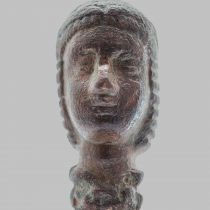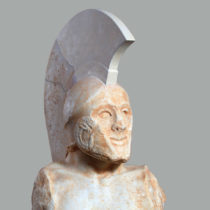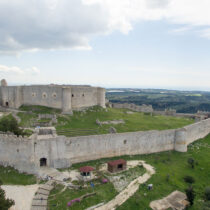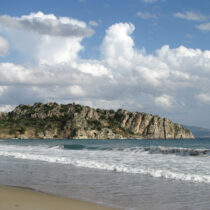Egypt Centre Zoom lectures
An additional ten free lectures have recently been added to the Egypt Centre virtual conference programme.
Unisa Classics Colloquium: Bellum ex altera parte
The annual Unisa Classics Colloquium will be held in Pretoria from 15 to 18 April 2021. The call for paper proposals will close at the end of January 2021.
Biological study of Tell es-Sin the Byzantine necropolis
A study published in the journal Bioarcheology of the Near East reveals the characteristics of the population that was buried in the Tell es-Sin necropolis.
Demographic expansion of several Amazonian archaeological cultures
The study uses simulation techniques and shows that some cultural expansions from Amazonia during the late Holocene may have arisen from similar demographic processes to the Neolithic in Eurasia.
Online tour of Frida Kahlo’s house
The villa, known as Casa Azul (Blue House), is the home where Kalo spent most of her life.
An ancient tradition is reexamined for telecommuting to be successful
The "hanko" or "inkan" is applied with red ink and then stamped on the necessary documents.
Three Hundred Years of Death
A detailed survey of the organisation of the necropolises and the funerary workers, as well as their role in the practical aspects of the mummification, funeral, burial, and mortuary cult of the deceased, in Ptolemaic Egypt.
New study casts doubt on impact of Justinianic plague
Historical research and mathematical modeling challenge the death rate and severity of this first plague pandemic, the Justinianic Plague.
Direct genetic link to current inhabitants of Southern Poland
By analysing the DNA of skeletons from the Neolithic and Bronze Ages, scientists from the Adam Mickiewicz University in Poznań found that there was a direct continuity of colonisation.
New Discoveries at the Mummification Workshop Complex at Saqqara
A new burial chamber has been discovered in the Mummification Workshop Complex in Saqqara by the Egyptian-German mission of the University of Tübingen, according to a recent announcement.
New fossils rewrite the story of dinosaur evolution and ecology
An international team of researchers has discovered unambiguous evidence that Spinosaurus aegyptiacus was aquatic, and used tail-propelled swimming locomotion to hunt for prey in a massive river system.
African skeletons tell the story of first-generation slaves
An interdisciplinary study into the origins and health status of three African skeletons unearthed in Mexico shows evidence of forced migration, physical trauma, and the introduction of infectious diseases from Africa.
Marooned on Mesozoic Madagascar
International team of researchers, led by David Krause, senior paleontologist at Denver Museum of Nature & Science and longtime Stony Brook U. professor, discover 66-million-year-old 'crazy beast'.
During tough times, ancient ‘tourists’ sought solace in Florida oyster feasts
More than a thousand years ago, people from across the Southeast regularly traveled to a small island on Florida’s Gulf Coast to bond over oysters, likely as a means of coping with climate change and social upheaval.
Archaeological sites are expected to open on May 18
Major archaeological sites will operate with special safety protocols, already being prepared, adapted for the specifics of each area.
Closer to Vermeer and the Girl
Two years ago, an international team of scientists from various museums and institutions examined Vermeer's masterpiece in full public view. Now the team unveils their new discoveries.
Evidence of Late Pleistocene human colonization of isolated islands
New isotopic study of fossil teeth shows flexible human adaptations to Pleistocene island life through time.
Deformed skulls reveal a multicultural community in transition
The ancient cemetery of Mözs-Icsei dülő in present-day Hungary holds clues to a unique community formation during the beginnings of Europe's Migration Period.
Ancient Egyptian Unguent Cones
PhD student of Egyptology Dora Goldsmith is offering a fun and educational online workshop this Sunday on the topic of unguent cones in ancient Egypt.
Classical Languages Summer School (CLaSS)
The Theological School of the Church of Cyprus (TSCC) launches in July 2020 the first Summer School in Cyprus focusing on the study of the classical languages.
Roman Society Museum & Heritage Summer Placement Scheme
Applications are invited for the Roman Society summer placement scheme.
Archaeological Atlas of Coptic Literature
The team of the ERC Advanced Grant “PAThs - Tracking Papyrus and Parchment Paths: An Archaeological Atlas of Coptic Literature” (Sapienza Università di Roma, P.I. Paola Buzi) announces the most recent outcomes of the project.
Diverse livelihoods helped Levänluhta people survive a climate disaster
A multidisciplinary research group coordinated by the University of Helsinki dated the bones of dozens of Iron Age residents of the Levänluhta site in Finland.
Progress of works in Amphipolis
Lina Mendoni requested a speeding up of procedures related to preparations of the static assessment and geotechnical study of the monument at the Kasta Tomb.




























